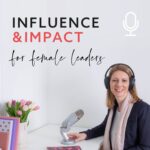I spend a lot of time coaching women around confidence, giving them tools to build their confidence and shining a light on the role gender bias plays in making us doubt ourselves. But confidence issues often start a long time before women enter the workplace and the pressure that girls face today thanks to social media is huge.
In this episode I interview Laura Sercombe, the inspiring CEO of GFS (Girl’s Friendly Society), a charity that works with girls to inspire and empower them to live their best lives. This year my business has been making a donation to fund a girl to attend one of GFS’s confidence building sessions for every participant in our open Be Bolder courses, so it was great to explore this topic with Laura.
We talked about why there is a need for the work GFS does, what’s causing girls as young as 6 to struggle with their confidence and the importance of positive role models and safe spaces where girls can be themselves.
Laura’s Bio:
For almost 30 years I have worked as part of the third sector in service delivery charities with a focus around challenging injustice – around education, disability and gender. I am driven by a desire to see more equity in the world and so it will be no surprise that I have a real interest in addressing EDI in the roles I have been fortunate to work in.
I am lucky enough to work in an environment I really enjoy; as CEO for GFS (Girls Friendly Society), a children’s charity with a mission to support girls to be proud of who they are. This is because girls as young as six tell us this is something they cannot do. Our hope is that this works contribute to the movement to address gender inequity for girls and young women.
At GFS, we work with girls across England and Wales in areas where research says they do not have the same life opportunities as their peers – to inspire and empower them to live their best lives.
GFS is an exciting charity that we are proud to be caretakers of. The history is extraordinary as GFS is one of the longest running charities in England and Wales, devoted solely to meeting the needs for girls and young women. We have a real focus on developing partnerships with organisations that are keen to be involved and support this objective.
From an early age, girls are well aware of the far reaching gender inequalities that exist for them. We are focused on building a fair society one girl at a time by inspiring the girls to think beyond their own experience and empowering them to have the confidence to live the life they want to. This takes hard work and dedication by the volunteers who deliver sessions each week for the girls.
GFS website: https://girlsfriendlysociety.org.uk/
Donate an hour: https://hour.girlsfriendlysociety.org.uk/
WORK WITH ME:
If you’d like to talk to me about working together do book a call.
How I work with individuals:
- 1:1 executive coaching
- Be Bolder confidence and assertiveness course
- Influence & Impact women’s leadership programme
How I work with organisations:
- Confidence training
- Women’s leadership masterclasses and programmes
- Allyship training
- Keynote speaking
We partner with you to:
· Develop your women leaders and prepare them to advance within the organisation
· Build women’s confidence – particularly your early and mid career level women
· Empower men and leaders to become allies for gender equity
We also offer individuals:
– Be Bolder, an open 4 week confidence and assertiveness course
– Influence & Impact, an open 3 month women’s leadership development programme
– 1:1 coaching
Get in touch to find out more or book a call with me at https://calendly.com/carla-miller/call-with-carla
CONNECT WITH ME
LinkedIn: https://www.linkedin.com/in/carlamiller1/
Instagram: https://www.instagram.com/thisiscarlamiller/
Website: https://www.carlamillertraining.com/
HOW CAN I SUPPORT THE PODCAST?
Subscribe
Share this episode with a friend
Leave a review on Apple Podcasts or Spotify
I would love to hear your feedback on this week’s podcast. Please leave a review or come say hello on social!
Thank you for listening, see you next week!
